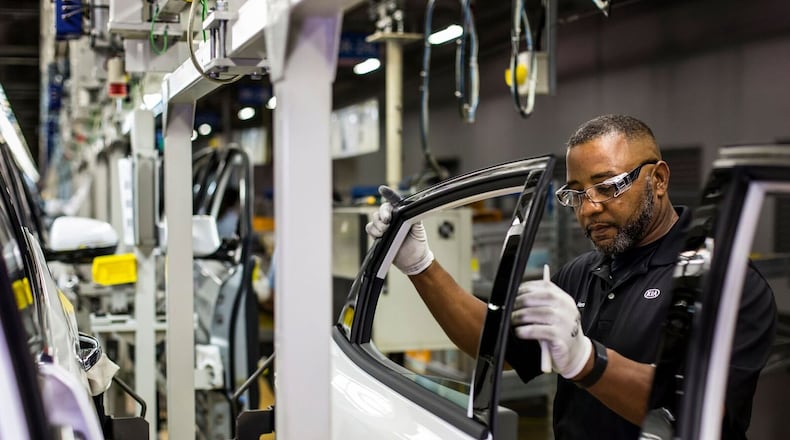SAVANNAH — Every drive past the under-construction Hyundai electric vehicle factory makes Trip Tollison equal parts excited and nervous.
Excited because the Hyundai Metaplant, the largest economic development project in Georgia history, and its suppliers will add an estimated 15,000 jobs to the region.
Nervous because Savannah and the surrounding area don’t have 15,000 workers to spare.
Tollison heads the Savannah Joint Development Authority (JDA), a coalition of four county economic development authorities and the group that partnered with the state to woo Hyundai to the nearly 3,000-acre site along Interstate 16 near Ellabell, about 30 miles west of Savannah. Not long after Hyundai signed on to build the electric vehicle and battery plant in May 2022 did Tollison — along with many other area government, business and educational officials — begin to express concerns about the Metaplant’s impact on the local labor force.
Savannah’s unemployment rate has ranged from 2.5% to 3.5% since the plant was announced, according to Georgia Department of Labor statistics. The most recent numbers, from September, show a rate of 3%.
A study released Tuesday anticipates the tight labor market conditions will continue. Commissioned by the Savannah JDA, the report projects Savannah-area manufacturers and other employers will encounter a severe worker shortage in 2025, shortly after the Hyundai plant begins production.
“We have a deficiency in industrial workers, and it won’t be long before we exhaust what we have here,” Tollison said. “Come 2025, it becomes a challenge and gets progressively worse — unless we do something about it.”
On Tuesday, Savannah JDA officials laid out a comprehensive strategy to address the shortfall. The approach calls for the formation of a Regional Workforce Development Collaborative for the Savannah area that will focus on three areas:
- Recruitment of military retirees and others exiting the Armed Forces from nearby installations, such as Fort Stewart. According to the study, 3,500 veterans exit the military locally each year, and 75% want to stay in the Savannah area.
- Building a pipeline of non-college bound high school graduates into the manufacturing sector. In the Savannah public schools alone, approximately 700 graduates a year go to work in the state immediately following graduation, according to statistics from the Georgia Governor’s Office of Student achievement.
- Attraction of experienced production and assembly line workers from other states. Hyundai has focused its recruitment on three Georgia neighbors — Tennessee, South Carolina and Alabama — already home to 10 different automakers. Tollison indicated the JDA will broaden its reach to include other Southern states as well as those in the Midwest.
Reshaping the labor landscape
The plan is designed to meet a projected labor force demand of 20,000 workers by 2030, with 16,000 of those employees needed by 2027. About half of those will be involved in production work, including general laborers, assemblers and machinists, according to the study.
Hyundai alone has pledged to employ 8,500 workers directly at the Metaplant by 2030 and is already staffing up, with 324 at work a year ahead of the plant’s scheduled opening. A Georgia Quick Start training center is under construction at the Metaplant and is expected to begin instruction next spring. With the battery factory slated to open in late 2024 and vehicle production to begin soon thereafter, Hyundai will employ thousands of workers by 2025.
A Hyundai spokesperson said there is “tremendous interest in employment at the Metaplant” from Savannah-area residents.
“We are investing not only in the existing workforce but also in the development of the future workforce, by continuing to develop relationships with educational institutions and military installations in his area to inform and train future Meta Pros,” said Hyundai’s Bianca Johnson. “With this investment in the community and the relationship with our business partners in the region, we have full confidence that we will be able to meet our hiring goals.”
Hyundai’s final headcount would make the automaker the second largest manufacturing employer in the area behind only Gulfstream Aerospace, the 12,000-employee business jet maker based in Savannah.
Gulfstream is currently in the process of hiring 1,600 additional staffers as it begins production of the G400 aircraft and increases capacity at its maintenance facilities. The company launched the hiring push in April and the G400 assembly plant was finished two weeks ago. Gulfstream expects to begin flight testing the G400 early next year.
A company spokesperson acknowledged local labor market conditions “present some challenges” but said Gulfstream is filling roles thanks to engagement with veterans and partnerships with Savannah’s public schools and Savannah Technical College, which offer training programs tailored to the aerospace industry.
Credit: Kathy Almand
Credit: Kathy Almand
Attracting labor isn’t just about staffing Hyundai and Gulfstream. The automaker will hire away employees currently working for Gulfstream and other Savannah-area businesses. Those companies will in turn lure talent from other firms in town.
The vacancies are expected to impact several sectors beyond manufacturing — warehousing, construction, retail, leisure and hospitality — and reshape Savannah’s labor landscape. Ruel Joyner, a Savannah businessman and a board member of the Savannah Economic Development Authority, applauded the release of the study and the Savannah JDA’s efforts to “break down silos” that could hinder addressing the looming labor shortage.
“This is our problem, the region’s problem, and we have to meet these challenges,” Joyner said.
Competition to come
The consulting group behind the workforce study, New Jersey-based Wadley Donovan Gutshaw, identified other areas of concern beyond Savannah’s existing labor force being “statistically tapped out” by 2025.
The consultants interviewed 19 local employers and another 40 workforce development stakeholders, such as local government and educational leaders and staffing agency pros, in researching the Savannah area. What they found most troubling was a high turnover rate for entry-level hires and fast-rising wages.
They estimate 40% of new hires leave their employers within the first 90 days of employment, turnover that can cost upward of 60% of annual salary. Much of the job jumping is related to worker demand, with starting wages increasing from $15 an hour to $18 an hour in the last two years and accelerating to $20 an hour.
The study says Hyundai employment growth “will likely establish a new benchmark within two to three years” in the range of $22 to $22.50 an hour.
Hyundai previously committed to average wages of more than $58,000 at the Metaplant. On Monday, Hyundai announced plans to increase production team hourly wages at the Metaplant by 25% between January 2024 and the end of 2028 “to remain competitive and to recruit and retain top talent.”
The move comes in the wake of the United Auto Workers union reaching deals with Ford, General Motors and Stellantis to increase wages by 25% at assembly plants in the Midwest.
Credit: Georgia Quick Start
Credit: Georgia Quick Start
Wages won’t be the only determining factor in the looming competition for employees. The study said workplace culture, career advancement opportunities, benefits, schedule flexibility and quality of management matter, particularly in a tight labor market.
Savannah JDA leaders on Tuesday affirmed their commitment to “do what it takes” to grow the local labor supply and put the training resources in place. In addition to the Quick Start training facility, Georgia Southern University has expanded its engineering programs to provide professional talent and Savannah Technical College has launched EV-related certification initiatives. And local K-12 schools are standing up technical and production-focused programs.
“We will have a robust pool,” Tollison said. “The question is: Will it be qualified enough? And if not, how quickly can we get there?”
About the Author
Keep Reading
The Latest
Featured





